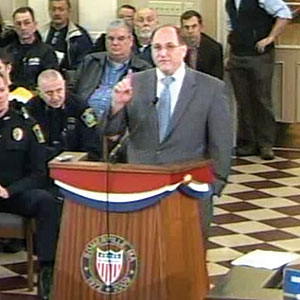
Congressman Michael Capuano warned of new austerity measures on the horizon for Somerville.
Congressman warns of more cuts
By Andrew Firestone
Severe cuts. A down economy. A loss of local jobs. Perhaps not the most vibrant of pictures, but one that might be the most realistic, given the future cuts in spending by the federal government.
In an address to the Board of Alderman, former Alderman and Mayor, Congressman Michael Capuano (D-Somerville) gave a holistic but harrowing view of where he believes the struggles in Washington will hit the people of Somerville. The view was not rosy.
“I have no problem discussing thoughtfully how we make ends meet, but I do have a serious problem if we’re only discussing one half of the balance sheet and that’s spending,” he said, regarding the $1.3 trillion in cuts the federal government will have to decide on in the next year, indicating the approach might “destroy the fabric of this society.”
Capuano outlined a ten percent cut in aid to Somerville, with an added ten percent every year. This would add up quickly, he said, and the results would not be pretty and would not immediately go towards cutting government down.
“I know what you are going to do. You’re not going to rebuild one playground, or whatever. When you lose these home funds, you’re going to not expand affordable housing.
“No one will lose anything out of their pocket, you just won’t do something that needs to be done. But what will happen is that the person who would be hired to rebuild that playground now won’t get hired. So, no one will lose a job out of this, but somebody won’t get a job, which is the same thing especially if you’re a private contractor in this market.”
“When I was on the Board of Alderman, and as a Mayor, anytime anybody came in to me and said we don’t like the budget, we need more, I’d slide the city budget across the table. ‘Say ‘fine,’ what do you want me to cut?”
“I personally think that when you do this to government, I have never seen, and no one has been able to show me a situation in the modern history of mankind, that cutting spending is good in an economic downturn,” he said.
“The obvious one is the Great Depression. Hoover thought that cutting was fine, and the Congress at the time thought it was fine. It didn’t work, FDR had to be elected, along with a Congress that agree with him to say, ‘you know what? When you’re down, you have to hire people. And if no one else is hiring, the government should hire.’ Not what you want, but it’s what you have to do to stimulate the economy.”
GLX: Commuter rail stops and Phase 1
Capuano also addressed the Green Line extension. He voiced support of the “phasing” plan, which includes building a fork of GLX trolley stations past a rebuilt Lechmere station at Union Square and Washington St. However, he said that looking past that might be “putting the cart before the horse,” and the most important thing was to get tracks on the ground as soon as possible.
“Approach it to say ‘let’s get what we can while we can,’ and stop focusing on what’s going to happen ten years from now,” he told the BOA. “It’s a mistake, you’ll end up having another promise and another promise three or four years from now. Take what you can get while we have a governor that cares about the project.”
“To ask for more is fine, and you’re right at a perfectionist level, but you will lose the Green Line unless you get realistic about this.” To this end, Capuano proposed the installation of several “inter-modal” and “multi-modal” stops along the commuter rails that run, but do not stop, in Somerville. While these would cost $30 to $50 million by his estimation, in “comparison to a billion, it’s not that much.”
“The state has not submitted, I know it doesn’t exist, a plan on how to fund the green line. They haven’t submitted it, because they don’t have the money. People need to wake up to that fact.”
“The federal government bailed the state out to the tune of $1 billion each year for the last ten years,” he said. “The state is going to have problems.”
Capuano brought up the holes in the conduct of the department of transportation (MassDOT) compared to the state implementation plan, (SIP) which is the legally mandated agreement to build the GLX by the state. While the SIP lists the GLX ending at “Medford Hillside” MassDOT has not included a Rt. 16 stop in their plans, and may be interpreting the agreement to not include the stop.
“I want the grand slam homerun. I don’t want to stop at Tufts. I actually think that’s a disservice to the City. I think we have to advocate the go to Rt. 16,” said Capuano.
Tom Bent, Somerville’s representative on the Metropolitan Planning Organization (MPO) said that MassDOT did not want to build out to Rt. 16, and would submit an application for federal “New Starts” money without it.
“To be honest with you, I’m not sure who makes the decision as to where Medford hillside actually is,” said Bent.
“The Administration supports the ultimate extension of the Green Line to Route 16, but does not have sufficient funding for the project, and is focused on delivering the SIP commitment to College Avenue in as expeditious a manner as possible,” said MassDOT press secy. Sara Lavoie.
The Boston MPO has provided funding for the extension to Route 16 in its long-range plan for the 2016-2020 timeframe. As part of the development of the MPO’s four-year transportation improvement program this spring, we expect the MPO to discuss the actual funding of the design of the project. Consistent with the long-range plan, that decision by the MPO would likely require the spending of federal highway funds for the design of the extension to Route 16
The MPO recently approved $476 million worth of bond allocation for the GLX of which only $20 has been set out to bond. While this might go a long way toward winning the application of matching “New Starts” money, the state also has a history of being denied these grants due to poor fiscal maintenance.
However, at a recent meeting of the Board of Directors of MassDOT, Transportation Secy. Richard Davey said that the federal government might pick up $400 to $500 million of the project. He declined to give a concrete funding plan at the meeting, and was questioned extensively by Board members.
“No matter what we do, we need to have state funding to at least match federal dollars. If the state hasn’t got the money to do that then it doesn’t matter how much the federal government is willing to give,” said Capuano in an interview. When asked if the state could manage such a project, Capuano said that they may be able to in the future, but at the moment they cannot.
“If the state can prove me wrong, believe me, I’ll be the happiest guy in the world.”
Davey reiterated his support for the build-out of the GLX in a statement. “This is an important project and one the state is committed to. We are moving forward with Phase One and look forward to continuing to work with the Congressman and the community.”
On Davey’s performance since being named Transportation Secy., Capuano was sympathetic. “He has an impossible situation,” he said. I have nothing but the best wishes for him, and high hopes for him.”















Reader Comments